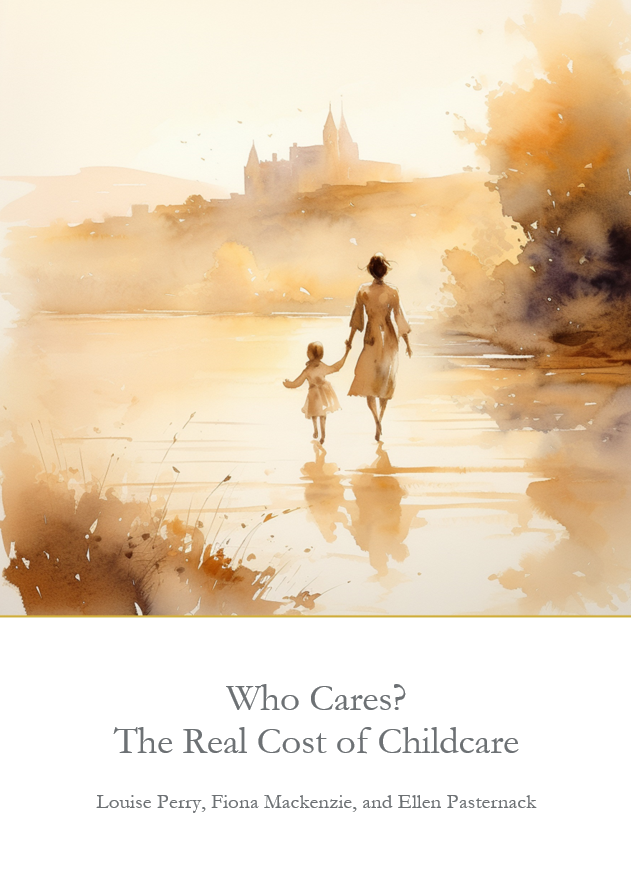Who Cares? The Real Cost of Childcare
“Care is at the centre of the human condition. To reflect this reality, we need to put it at the centre of political thinking and business environments. If we adopt a care-centric perspective, a more prosperous, enriching, and rewarding world is waiting for us.”
In this paper, Louise Perry, Fiona Mackenzie, and Ellen Pasternack show how our modern societies have lost sight of the value of both children and care, and propose practical solutions that would help restore their importance.
Summary of Research Paper
The importance of care
How would you arrange your childcare if money were no object? A five-star rated daycare with intellectually stimulating toys, an adventure playground, and all the time you need to comfortably make it home from work?
Perhaps unsurprisingly, this is not how the majority of parents in the UK responded when asked this question. The most popular option was that they or their partner would stay at home to care for their children themselves, rather than going to work. The truth is most parents long for more quality time with their young children, not less.
And that love and deep attachment is what makes parents the best qualified carers for their children. As this paper shows, caring for children cannot—and should not—be diminished to just meeting their most basic physical needs. Giving our children an abundance of love, security, recognition, and value is our greatest priority.
The current model
Children thrive when cared for by their parents, and other family members, such as grandparents, provide a second-best alternative. As a society, we should be aiming to prioritise caring for our loved ones, and moulding secondary priorities, such as work and expenses, around these core figures in our lives, not the reverse.
However, in our modern lives we have lost sight of the value of care. For many, childcare is something to be fitted around work schedules, social activities, or squeezed out by financial pressures. These things are good in and of themselves, but we must ask how we have allowed them to take precedence over caring for our children.
Couples should be free to care for their children in ways that are best for their families. Yet, the government has already made a choice for parents by subsidising formal, institutionalised childcare. Outsourcing care entrenches separation between young children and their parents, and leaves parents in a difficult position of having to choose work over care. The government's plans are out of step with parents’ desires. How can this balance be redressed?
It is each of our responsibilities to cultivate a culture that puts children, parenting, and raising future generations front and centre. By taking a few simple steps to reform the childcare environment around us, we make choosing to care for our children in a way that most benefits their emotional wellbeing an easier step to take.
Solutions
As this paper points out, we can create a culture of care and give families freedom to choose how they care for their children with low-cost, simple solutions:
Childcare budgets. Giving government childcare subsidies directly to parents as a ‘childcare budget’ would give parents an additional £1,215 per year, per child between the ages of one and four. Parents can then choose whether to spend this money on formal childcare, paying a nanny, staying at home, or covering the travel costs of a grandparent to care for their grandchildren.
Family-based taxation. Taxing families as units rather than individuals would enable couples to choose flexible work patterns to accommodate their childcare choices and jobs. If one parent wishes to stay at home whilst the other earns more highly, they should not be penalised.
Work that works for families. Normalising flexible options such as part-time hours, career breaks, and hybrid working can help families find a modern balance between time at home and in the workplace. Businesses could design “graduate scheme” equivalents to give parents opportunities to re-enter the workforce after career breaks taken to raise their children. Paying employees sustainable wages would enable employers and employees to share the rewards of labour equitably.
Affordable home ownership. Making it easier and cheaper for couples to buy homes where they can raise their children will give them the space and stability they need to care for their growing families.
It is each of our responsibilities to cultivate a culture that puts children, parenting, and raising future generations front and centre. By taking a few simple steps to reform the childcare environment around us, we make choosing to care for our children in a way that most benefits their emotional wellbeing an easier step to take.

